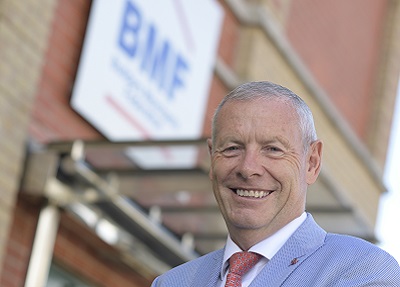View from the Chair
by Peter Hindle MBE, BMF Chairman
15 October 2017

The AGM of the BMF at Members’ Day not only makes the BMF accountable to members, it also provides a useful opportunity to remind ourselves of the role of the Board, ie
-
To be prudent custodians of the BMF’s assets
- To provide financial planning in support of the BMF’s goals and objectives
- To provide timely and accurate financial statements
This year, my fourth as Chair, we were able to present some impressive numbers.
Membership continues to grow at a rate of one new member a week, with merchants and supplier companies alike recognising the value of joining. But with more resources in place to support members, a high proportion of the Federation’s income now comes from training and events rather than subscriptions. Add to this the growth in value of the BMF’s property and investment portfolios and the 2016/17 accounts show a cash surplus of £243,000.
This presents the Federation with an opportunity to invest in new areas. As a company limited by guarantee, we do not want to retain a lot of profit when it could be used to benefit members. Last year, for example, we invested £55,000 in a new CRM system, which is helping us to engage better with our members.
I’ve said before that members are at the heart of the Federation but, in fact, they are in charge, and the Board is elected to carry out their wishes. With this in mind, we would welcome ideas from members on what they would like to see the BMF doing next. What do you think we should invest in to help you? Should we put more funds into existing campaigns, such as our Youth Recruitment campaign? Should we upgrade operations, as we have done with the new CRM system? Or should we explore a completely new area?
Business plans
The rest of Members’ Day focused on Building Beyond Brexit. The programme brought together a variety of speakers all of whom offered a consistent underlying message. Their eminently sensible advice is to concentrate on things within your control, rather than worrying about what the outcome of Brexit may be.
Ian McCafferty, who sits on the Bank of England’s Monetary Policy Committee, said the economy was slowly normalising following the last financial crisis, but is now having to absorb the consequences of leaving the EU, the impact of which will again be spread out over a long period. His advice was not to pay too much attention to short term reports of Brexit negotiations, where there is a lot of game-playing by all parties. Instead, focus on the fundamentals of business and don’t get distracted.
The Confederation of British Industry (CBI), which is promoting transitional arrangements as the key to a good Brexit, has studied the views and actions of businesses in eighteen different sectors. Nicole Sykes, the CBI’s Head of Brexit Negotiations, told us that 60% of business are carrying on as normal. Some sectors have looked at contingency plans if there is no deal, but they seem unwilling to put them in place just yet.
The CBI clearly wants to see a smooth exit, with barrier free EU trade, access to talent and people at all levels of the labour market and stability and certainty in regulations, but they also see opportunities from change. As Nicole said, disruption can be a good thing when it leads to new ideas.
How we view and use IT may be an area that could benefit from disruption. Microsoft’s James Akrigg pointed out that traditionally IT spend has been heavily weighted towards data storage and back up, and maintenance of hardware. Far less is spent on technology that can create value from that data, but should we now explore how IT can improve the customer’s experience to benefit our business?
Three very different speakers - Housing and Planning Minister, Alok Sharma, Jaydon Silver of retirement home specialist McCarthy & Stone, and Arthur McArdle, National Vice President of the Federation of Master Builders (FMB) - focused on the strength of the housing market in their presentations.
No-one can doubt that Brexit will continue to cause uncertainty for years rather than months. But trying to second guess the outcome of the current negotiations, is a fool’s errand. A good business will survive and thrive no matter what comes to pass. Within our sector the ongoing need for new housing and housing upgrades looks set to continue, and we should concentrate on this as an opportunity for business growth.
The article above featured in the October 2017 edition of Builders Merchants Journal